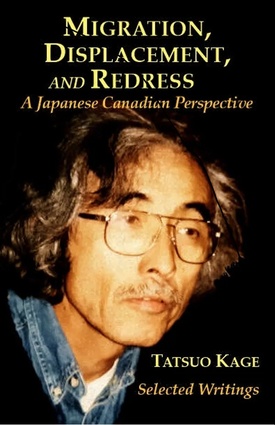Tatsuo Kage’s Migration, Displacement, and Redress: A Japanese Canadian Perspective is an opportunity. It is an opportunity not only to re-read passages from Tatsuo’s many brilliant writings, but to re-think, as a community, what these writings mean to us. As a Gosei scholar-activist myself, Tatsuo’s decades-long work quite literally made possible much of the work to which I and, I know, many others, are now dedicated. Indeed, it nearly goes without saying that this book is a testament to Tatsuo’s long-standing scholarly and activist work in and beyond the Japanese Canadian community.
What is perhaps less obvious, however, is that this book is a testament to how much we, as a community, have missed: when we call ourselves the “Japanese Canadian” community, so emphasizing our Canadianness, who is left out? When we long for a lost home, even envision its return, particularly in Paueru-gai (the Powell Street neighbourhood), in Vancouver’s present-day Downtown Eastside, whose displacement might we be risking? And when we advocate for redress, as we recently have been (with the Province of British Columbia and the City of Vancouver), what injustices remain untended? Tatsuo’s book asks these questions, sometimes implicitly, sometimes explicitly, from a place of love, care, and desire for justice for all. Here is a book in which we might see ourselves—including those of us who arrived in Canada after World War II, as Tatsuo himself did—but in which, in seeing ourselves, we are asked to come to terms with our mistakes, our forgetfulness, our fears. Like Tatsuo himself, these writings are gentle, but they are also a call, a question: How can we do better?
Organized into three sections named in the book’s title, Migration, Displacement, and Redress presents Tatsuo’s writings according to theme rather than chronology. Further, as a collection of selected writings, this book functions as a sort of archive, in which we hear Tatsuo’s voice differently, by turns personal, political, and scholarly. Included here are community and academic articles, speeches, reports, workshops, histories, anecdotes, petitions, letters, and interviews. Originally published in esteemed community publications including The Bulletin / Geppo, as well as Nikkei Images, Nikkei Voice, and KAIHO / 会報 (the newsletter of the Greater Vancouver Japanese Immigrants’ Association (JIA), of which Tatsuo was a founding member), or else presented at local, national, and international conferences, the writings in this book keenly reflect concerns that are both unique to and important beyond the Japanese Canadian community. Across these pages, Tatsuo emphasizes—and, surely, were any of us able to safely visit him today, he would emphasize to us now—the importance of human rights.
In this book as elsewhere, Tatsuo balances care for our community with a kind of political commitment to and even love for all people. In “Migration,” Tatsuo’s writings chronicle the challenges that postwar Japanese immigrants face(d) in Canada, in terms of language, family, mental health, as well as international, local, and intra-community dynamics. In “Displacement,” Tatsuo’s writings reflect his concern for communities beyond our own, including Ukrainian, Chinese, and Italian Canadians, as well as victims of the Japanese government’s and Imperial Army’s violence (i.e. the Nanking Massacre and the forced sexual slavery of “comfort women”). In “Redress,” Tatsuo’s writings reflect a growing, if complicated, sense of connection and solidarity in the Japanese Canadian community, much of which, as his writings show, was made possible by the difficult work of reckoning with a Japanese inheritance—an inheritance that Tatsuo sees as befalling Japanese and Japanese Canadian people.
Tatsuo’s writings offer strokes, splashes, and sparks of wisdom, not least being those that speak to our unfinished work: “there was a price,” says Tatsuo, to our ‘inclusion’ in the Canadian nation, not just “emotional repression, denying justified anger with Canada, feeling shame, [and] assimilating as a way to secure future well-being and acceptance,” but crucially, the “limiting . . . of a political voice, and, for the most part, supporting the status quo” (68). It is worth stating outright: this is a high, high price. What are the stakes of supporting the status quo? Who among us is still suffering? Who of our neighbours—other racialized and oppressed communities—is still suffering? In Tatsuo’s words, although “there has been a lot of improvement . . . you can’t sit on what you achieved. You always have to be watchful” (136).
In this year of 2020, during which time we have seen the arrival of COVID-19; witnessed untold state and police violence against Indigenous, Black, unhoused, and other oppressed communities across North America; and watched as bush- and wild-fires have devastated climates across the globe, Tatsuo Kage’s new book, Migration, Displacement, and Redress: A Japanese Canadian Perspective arrives as a kind of question: how will we, individually, together, and with our neighbours, stand against this kind of suffering, hate, and carelessness? As a Japanese Canadian Gosei scholar-activist, I am eager to recommend this book to all readers, in our community and elsewhere. It is a resource in the traditional sense—for classrooms (at the high-school and post-secondary levels), for theorists, for those of us who have dedicated ourselves to knowledge—but also it is a gift to community, to family, to people. For decades, Tatsuo has written his wisdom down for us. His daughter, Mariko, has collected it, and presented it here, in the form of this book. It is our turn, now, to read it.
MIGRATION, DISPLACEMENT, AND REDRESS: A JAPANESE CANADIAN PERSPECTIVE
By Tatsuo Kage
(Electromagnetic Print, 2020)
Read Mariko Kage’s reflections on her parents, Tatsuo and Diane Kage >>
* This article was originally published in The Bulletin: A Journal of Japanese Canadian Community, History, and Culture on December 4, 2020.
© 2020 Angela May



